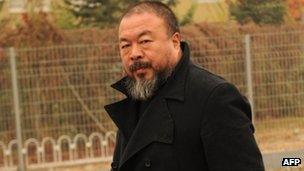Chinese media quiet on Ai Weiwei
- Published

Artist Ai Weiwei has been fined for not paying tax
While the twists and turns in the case of Chinese artist Ai Weiwei and his tax demand are being closely followed by Western media, they are making no headlines in China.
Some 30,000 supporters have made small donations to Ai to help him pay a huge fine imposed by the authorities, which is seen by activists as part of a government effort to silence the outspoken artist.
But the official media have made almost no mention of the case in recent days.
A notable exception is the Global Times, a nationalist tabloid owned by the Communist Party mouthpiece People's Daily, which has published commentaries in both Chinese and English questioning the level of domestic support for him.
"The real market for Ai is abroad," the paper said on Wednesday, adding that "without the support of the West, Ai is literally nothing".
But Ai remains a hot topic on China's vibrant social media.
His supporters have been slamming the Global Times articles on microblogs and spreading his video tribute to his "creditors" on video-sharing sites.
'Eliminated'
According to the Global Times, supporters for Ai and other dissidents are just a tiny minority who do not represent the wider Chinese public.
"Is 30,000 a big number, compared to China's population of 1.3 billion?" the paper asked.
"For 30 years, Ai Weiweis have emerged and fallen. But China has kept rising despite their pessimistic predictions. The real social trend is that they will be eliminated in the rising process of China," said the commentary.
The article was lambasted on Weibo, a Twitter-like microblogging platform.
"Is it appropriate to say certain types of Chinese people should be eliminated, even for a propaganda organ?" asked one microblogger.
"Let's wait and see who will be eliminated first," said another, suggesting that Ai and his supporters were on the right side of history.
Commentary pulled
This is not the first time the Global Times has commented on Ai Weiwei's case, a subject most other Chinese media outlets do not dare to cover.
The paper appears to have official permission to touch upon sensitive issues like this and defend Beijing's position against criticisms on the internet and from abroad.
But even the Global Times has suffered from censorship when covering Ai.
A 7 November article, which suggested that Ai could be charged with "illegal fundraising" for accepting the donations, was apparently pulled from the paper's Chinese-language website soon after it was published.
Internet users speculated at the time that the propaganda authorities might have decided to take the article offline because they did not want Ai's case to gain more publicity.
Musical tribute
But the move did not seem to have worked, and Ai's message kept spreading and donations kept coming in.
Responding to demands from his "creditors", Ai posted a video online showing himself dancing and singing along to a song composed by Chinese internet users to express defiance against censorship.
The song tells how the fictional "grass mud horses" (the Chinese pronunciation of which sounds like a profanity) defeated "river crabs", which symbolizes China's internet censorship.
The video has been deleted from China's Sina website, but can still be watched on YouTube.
"A sense of humour is needed during the painful process of resistance," an internet user commented.
<link> <caption>BBC Monitoring</caption> <url href="http://www.monitor.bbc.co.uk/" platform="highweb"/> </link> <italic> selects and translates news from radio, television, press, news agencies and the internet from 150 countries in more than 70 languages. It is based in Caversham, UK, and has several bureaux abroad.</italic>
- Published11 November 2011
- Published20 July 2012
- Published13 October 2011
- Published29 June 2011